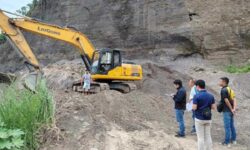
Group calls for stricter quarry regulations
A DAVAO City-based environmental group is advocating for the Quarrying Regulation Ordinance in response to recent illegal earthquake quarrying in Catalunan Grande.
Enp. Lemuel Manalo, the program coordinator for Interfacing Development Interventions for Sustainability (Idis), informed SunStar Davao on Monday, September 23, 2024, that the proposed ordinance is currently undergoing committee hearings led by Councilor Temujin “Tek” Ocampo.
Manalo underscored the need for strict regulations on monitoring earthfill quarrying, highlighting that these operations contribute little tax revenue compared to sand and gravel quarrying while posing significant environmental risks.
Proposed penalties
During the Aprobado sa Konseho meeting on September 24, Ocampo acknowledged that penalties for violating quarry regulations are not severe enough to deter errant operators. Although many quarry operators opposed the proposed penalties, Ocampo insisted that enforcing legal processes is essential.
“Gusto man gyud natu na ang makabenefit ang mga legal quarry operators that’s why atoa ning gipanday na ordinansa kay kung kani siya mahimo ni siyang balaod kani atoang mga legal quarry operators will help the government, will help the LGU kay sila naman mureport sa illegal kay lugi man sila (We want legal quarry operators to benefit from this ordinance. Once it becomes law, these operators will help the government and local government units (LGUs) by reporting illegal activities, as they would be at a disadvantage),” he said.
The proposed penalties for illegal quarry operators include a fine of P3,000 per cubic meter for the first offense, with the confiscation of quarry materials. The penalty for a second offense would increase to P5,000 per cubic meter.
Ocampo clarified that the ordinance is still fine-tuned to ensure orderly and legal quarry operations within the city.
Monitoring challenges
Manalo stressed the importance of enacting this ordinance to ensure its implementation, even if there is a change in administration. He mentioned plans for the immediate creation of the Implementing Rules and Regulations (IRR) once the ordinance passes.
Additionally, the proposed ordinance stipulates that quarrying operations should only occur from 7 a.m. to 5 p.m., with violations subject to penalties.
He shared that monitoring earthfill quarrying has been a huge challenge since some illegal quarries only mention that they need to clear the land for a subdivision that would be constructed in the area. However, Manalo stressed that the permits for constructing the subdivision and the land quarrying but masquerading as land preparation are different.
Monitoring earthfill quarrying has proven challenging, as some illegal operators claim they need to clear land for subdivision construction.
Manalo clarified that permits for construction and land clearing are distinct, and unauthorized earth-fill quarrying is prohibited without proper permits due to its significant environmental risks.
Ocampo reported that the committee hearing last week compiled inputs and recommendations, which have been forwarded to the City Legal Office for review. Once approved, the ordinance will be sent to the plenary.
Community engagement
The recent illegal earthfill quarrying incidents in Catalunan Grande prompted community members to act as watchdogs, reporting their concerns to the barangay, which then alerted the City Environment and Natural Resources Office (CENRO) and the Environment Management Bureau-Davao Region (EMB-Davao).
Before any earthfill quarry can operate, it must comply with legal processes, including an environmental management plan and risk assessments. This involves evaluating the area’s topography, soil composition, and geology, which must be approved by a licensed mining engineer. Without these steps, quarrying is not permitted.
Manalo noted that legally compliant earthfill quarry operations are required to implement reforestation measures, and their permits will not be renewed if they fail to do so. The rigorous approval process for quarrying reflects the high risks of landslides and environmental damage associated with these activities.
Public awareness
The environmental group encourages Dabawenyos to be vigilant about quarrying activities, particularly since the city’s Zoning Ordinance prohibits quarrying in Critical Watershed and Conservation Zones. They urge the public to report illegal activities to relevant government agencies, including the barangay, CENRO, or the Mines and Geosciences Bureau (MGB).
Recently, four individuals involved in illegal mining and quarrying activities in Catalunan Grande were charged under Republic Act 7942, known as the Philippine Mining Act of 1995, after failing to present legal documents for their operations. This action followed a report of illegal quarrying at Purok 41 Saavedra Relocation on September 17, 2024, which prompted responses from the MGB, CENRO, and local officials. RGP



